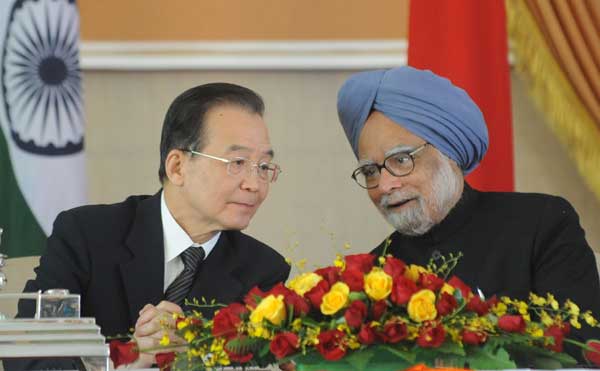

China and India to open hotline, formalize regular political contact
 |
|
Premier Wen Jiabao talks to Indian Prime Minister Manmohan Singh during a signing ceremony in New Delhi on Thursday. [Photo/Agencies] |
NEW DELHI - China and India vowed on Thursday to raise bilateral trade to $100 billion by 2015, from $60 billion in 2010, and called for a stronger partnership between Asia's two giants.
"I believe with our joint efforts ... we'll be able to raise our friendship and cooperation to a high level in the new century," said Premier Wen Jiabao, standing alongside Indian Prime Minister Manmohan Singh at the Indian presidential palace after a red-carpet welcome ceremony.
A joint communiqué issued after the talks between Wen and Singh said the two nations will formalize regular visits between heads of state and government, open a telephone hotline between the two premiers and their foreign ministers will meet once a year.
The two sides agreed to initiate a strategic economic dialogue to enhance macro-economic policy coordination.
The two leaders also set the ambitious goal of bilateral trade reaching $100 billion in 2015, and announced the year 2012 as "Year of China-India Exchanges".
China is India's largest trade partner and the trade has been heavily in China's favor.
Two-way trade is expected to reach $60 billion in 2010 compared with a target of $40 billion, which represents a 30-fold increase since 2000.
Wen pledged to address the trade deficit, which has risen from $1 billion in 2001-2002 to $16 billion in 2007-2008.
"The two sides agreed to take measures to promote greater Indian exports to China with a view to reducing India's trade deficit," the joint statement said.
Singh and Wen also agreed to push forward with efforts to peacefully resolve their nations' lingering border disputes.
Wen said both sides must be patient and sincere and try to maintain peace along the border and seek a fair and reasonable solution to the issue.
The two nations share some 2,000 kilometers of border that has never been formally settled.
Progress was also made on the political front.
"China understands and supports India's wish for a bigger role in the United Nations including the UN Security Council," Wen said when addressing Indian academic élites at the Indian Council of World Affairs, a leading think tank.
"As a large country with more than 1 billion people and developing fast, India should be, and is capable of, playing a more and more important role in international affairs," Wen said.
The premier also addressed many of India's concerns.
On cross-border rivers that India has long claimed China is damming, Wen said "any exploitation in the upper stream will go through scientific planning and studies" and interests of the lower-reach nations will be taken fully into account. Earlier in the day, the two nations' ministries of water resources signed a memorandum for China to provide data to India.
Wen also said Beijing would like to strengthen consultation with India on political and military affairs to beef up mutual trust.
Wen said that India and China were not rivals and there was room in the world for both powers to develop. "China will forever hold positive views on the development of a stronger India... We're friends and will never be rivals," he said.
A series of agreements were signed on finance, green technology, and media exchanges.
Singh accepted Wen's invitation to visit China next year.
B.R. Deepak, a professor at the Center of Chinese and Southeast Asian Studies at Jawaharlal Nehru University, said Wen's remarks sent a positive message.
"It is encouraging to hear China is willing to allow the Indian service sector, pharmaceutical and agricultural products to enter the Chinese market. It will help bring down India's trade deficit," Deepak said.
"Establishing a strategic and economic dialogue mechanism with India means both sides regard each other as a very important partner," said Fu Xiaoqiang, a scholar in South Asia studies at the China Institutes of Contemporary International Relations.
It could help smooth economic friction, but the significance lies more in filling the trust deficit and enabling India and China to work more closely on international affairs, Fu added.
Wen's visit, the first of a Chinese premier in five years, has dominated headlines. On Thursday Indian TV ran extensive footage of Wen shaking hands with Singh, while many papers published special editions to mark the visit.
The Hindustan Times newspaper covered almost every detail of Wen's trip.
"Wen Jiabao's trip to India... lacks the hype and glamour that accompanied the recent visits by US President Barack Obama and his French counterpart Nicolas Sarkozy. But ... it can potentially deliver far higher strategic and economic dividends," the paper said.
Wen will leave India on Friday for a two-day state visit to Pakistan.
Ai Yang, Reuters contributed to this story.